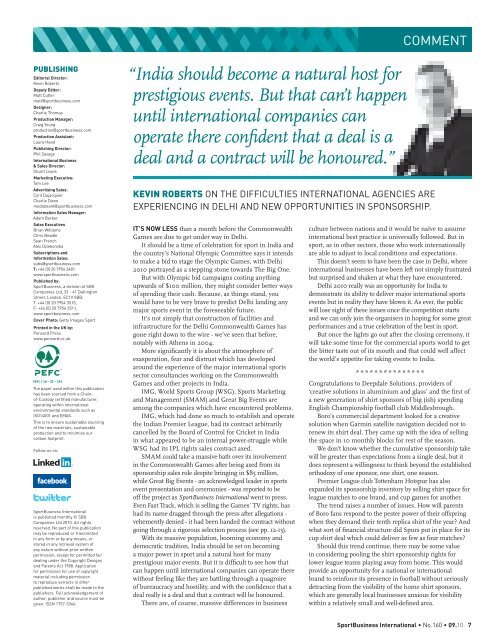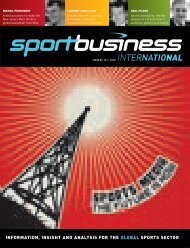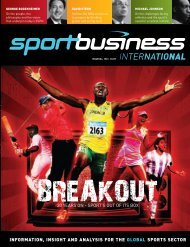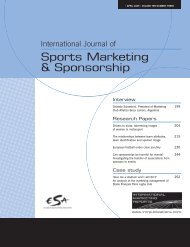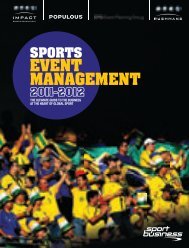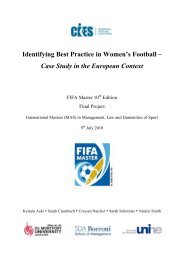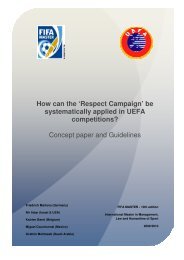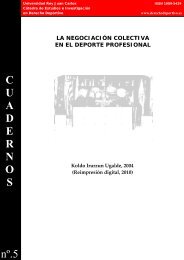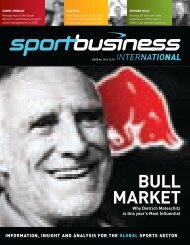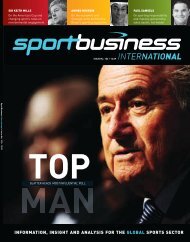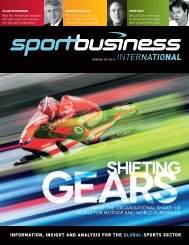4 - FIFA/CIES International University Network
4 - FIFA/CIES International University Network
4 - FIFA/CIES International University Network
You also want an ePaper? Increase the reach of your titles
YUMPU automatically turns print PDFs into web optimized ePapers that Google loves.
COMMENT<br />
PUBLISHING<br />
Editorial Director:<br />
Kevin Roberts<br />
Deputy Editor:<br />
Matt Cutler<br />
matt@sportbusiness.com<br />
Designer:<br />
Charlie Thomas<br />
Production Manager:<br />
Craig Young<br />
production@sportbusiness.com<br />
Production Assistant:<br />
Laura Head<br />
Publishing Director:<br />
Phil Savage<br />
<strong>International</strong> Business<br />
& Sales Director:<br />
Stuart Lewis<br />
Marketing Executive:<br />
Tom Lee<br />
Advertising Sales:<br />
Cyril Dujacquier<br />
Charlie Dixon<br />
mediateam@sportbusiness.com<br />
Information Sales Manager:<br />
Adam Barker<br />
Sales Executives<br />
Brian Williams<br />
Chris Beadle<br />
Sean French<br />
Alex Dziekonska<br />
Subscriptions and<br />
Information Sales:<br />
subs@sportbusiness.com<br />
T: +44 (0) 20 7954 3481<br />
www.sportbusiness.com<br />
Published by:<br />
SportBusiness, a division of SBG<br />
Companies Ltd, 33 - 41 Dallington<br />
Street, London, EC1V 0BB,<br />
T: +44 (0) 20 7954 3515,<br />
F: +44 (0) 20 7954 3511,<br />
www.sportbusiness.com<br />
Cover Photo: Getty Images Sport<br />
Printed in the UK by:<br />
Pensord Press<br />
www.pensord.co.uk.<br />
The paper used within this publication<br />
has been sourced from a Chainof-Custody<br />
certified manufacturer,<br />
operating within international<br />
environmental standards such as<br />
ISO14001 and EMAS.<br />
This is to ensure sustainable sourcing<br />
of the raw materials, sustainable<br />
production and to minimise our<br />
carbon footprint.<br />
Follow us on:<br />
SportBusiness <strong>International</strong><br />
is published monthly © SBG<br />
Companies Ltd 2010. All rights<br />
reserved. No part of this publication<br />
may be reproduced or transmitted<br />
in any form or by any means, or<br />
stored in any retrieval system of<br />
any nature without prior written<br />
permission, except for permitted fair<br />
dealing under the Copyright Designs<br />
and Patents Act 1988. Application<br />
for permission for use of copyright<br />
material including permission<br />
to reproduce extracts in other<br />
published works shall be made to the<br />
publishers. Full acknowledgement of<br />
author, publisher and source must be<br />
given. ISSN 1757-5346.<br />
“India should become a natural host for<br />
prestigious events. But that can’t happen<br />
until international companies can<br />
operate there confident that a deal is a<br />
deal and a contract will be honoured.”<br />
KEVIN ROBERTS ON THE DIFFICULTIES INTERNATIONAL AGEN<strong>CIES</strong> ARE<br />
EXPERIENCING IN DELHI AND NEW OPPORTUNITIES IN SPONSORSHIP.<br />
IT’S NOW LESS than a month before the Commonwealth<br />
Games are due to get under way in Delhi.<br />
It should be a time of celebration for sport in India and<br />
the country’s National Olympic Committee says it intends<br />
to make a bid to stage the Olympic Games, with Delhi<br />
2010 portrayed as a stepping stone towards The Big One.<br />
But with Olympic bid campaigns costing anything<br />
upwards of $100 million, they might consider better ways<br />
of spending their cash. Because, as things stand, you<br />
would have to be very brave to predict Delhi landing any<br />
major sports event in the foreseeable future.<br />
It’s not simply that construction of facilities and<br />
infrastructure for the Delhi Commonwealth Games has<br />
gone right down to the wire - we’ve seen that before,<br />
notably with Athens in 2004.<br />
More significantly it is about the atmosphere of<br />
exasperation, fear and distrust which has developed<br />
around the experience of the major international sports<br />
sector consultancies working on the Commonwealth<br />
Games and other projects in India.<br />
IMG, World Sports Group (WSG), Sports Marketing<br />
and Management (SMAM) and Great Big Events are<br />
among the companies which have encountered problems.<br />
IMG, which had done so much to establish and operate<br />
the Indian Premier League, had its contract arbitrarily<br />
cancelled by the Board of Control for Cricket in India<br />
in what appeared to be an internal power-struggle while<br />
WSG had its IPL rights sales contract axed.<br />
SMAM could take a massive bath over its involvement<br />
in the Commonwealth Games after being axed from its<br />
sponsorship sales role despite bringing in $85 million,<br />
while Great Big Events - an acknowledged leader in sports<br />
event presentation and ceremonies - was reported to be<br />
off the project as SportBusiness <strong>International</strong> went to press.<br />
Even Fast Track, which is selling the Games’ TV rights, has<br />
had its name dragged through the press after allegations -<br />
vehemently denied - it had been handed the contract without<br />
going through a rigorous selection process (see pp. 12-13).<br />
With its massive population, booming economy and<br />
democratic tradition, India should be set on becoming<br />
a major power in sport and a natural host for many<br />
prestigious major events. But it is difficult to see how that<br />
can happen until international companies can operate there<br />
without feeling like they are battling through a quagmire<br />
of bureaucracy and hostility, and with the confidence that a<br />
deal really is a deal and that a contract will be honoured.<br />
There are, of course, massive differences in business<br />
culture between nations and it would be naïve to assume<br />
international best practice is universally followed. But in<br />
sport, as in other sectors, those who work internationally<br />
are able to adjust to local conditions and expectations.<br />
This doesn’t seem to have been the case in Delhi, where<br />
international businesses have been left not simply frustrated<br />
but surprised and shaken at what they have encountered.<br />
Delhi 2010 really was an opportunity for India to<br />
demonstrate its ability to deliver major international sports<br />
events but in reality they have blown it. As ever, the public<br />
will lose sight of these issues once the competition starts<br />
and we can only join the organisers in hoping for some great<br />
performances and a true celebration of the best in sport.<br />
But once the lights go out after the closing ceremony, it<br />
will take some time for the commercial sports world to get<br />
the bitter taste out of its mouth and that could well affect<br />
the world’s appetite for taking events to India.<br />
* * * * * * * * * * * * * * *<br />
Congratulations to Deepdale Solutions, providers of<br />
‘creative solutions in aluminium and glass’ and the first of<br />
a new generation of shirt sponsors of big (ish) spending<br />
English Championship football club Middlesbrough.<br />
Boro’s commercial department looked for a creative<br />
solution when Garmin satellite navigation decided not to<br />
renew its shirt deal. They came up with the idea of selling<br />
the space in 10 monthly blocks for rest of the season.<br />
We don’t know whether the cumulative sponsorship take<br />
will be greater than expectations from a single deal, but it<br />
does represent a willingness to think beyond the established<br />
orthodoxy of one sponsor, one shirt, one season.<br />
Premier League club Tottenham Hotspur has also<br />
expanded its sponsorship inventory by selling shirt space for<br />
league matches to one brand, and cup games for another.<br />
The trend raises a number of issues. How will parents<br />
of Boro fans respond to the pester power of their offspring<br />
when they demand their tenth replica shirt of the year? And<br />
what sort of financial structure did Spurs put in place for its<br />
cup shirt deal which could deliver as few as four matches?<br />
Should this trend continue, there may be some value<br />
in considering pooling the shirt sponsorship rights for<br />
lower league teams playing away from home. This would<br />
provide an opportunity for a national or international<br />
brand to reinforce its presence in football without seriously<br />
detracting from the visibility of the home shirt sponsors,<br />
which are generally local businesses anxious for visibility<br />
within a relatively small and well-defined area.<br />
SportBusiness <strong>International</strong> • No.160 • 09.10 7


